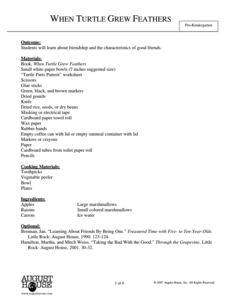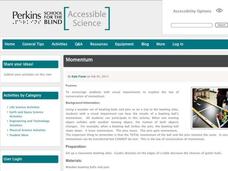Curated OER
Pronoun Reference
Do your young readers have a hard time with using the correct pronouns? Use this resource to help them practice identifying and fixing incorrect pronouns. The learning exercise includes twenty sentences, some of which need to be fixed,...
Curated OER
Could Have, Should Have, Would Have
Could have, should have, would have learned your auxiliary verbs! Use this resource to describe the meaning of each set of words, and then let your kids try to complete the given sentences. Since most people don't actually take the time...
Curated OER
Reading Comprehension 4: level 9
Whether you use this reading comprehension worksheet as the basis for a short lesson on comprehension strategies or for additional practice, the passage about tricky octopi is sure to engage the interest of your young scientists.
August House
When Turtle Grew Feathers
Friendship is a valuable part of growing up. Learn about the importance of friendship with a variety of activities based on When Turtle Grew Feathers by Tim Tingle. Kids practice making musical instruments, discussing plot points,...
August House
Anansi Goes To Lunch - First Grade
Greed is the theme of this collection of multidisciplinary activities. As a class, read The West African folktale, Anansi Goes to Lunch by Bobby Norfolk, and take part in a grand discussion about it's plot and theme. Reinforce the theme...
Perkins School for the Blind
The Germinator
How does a plant grow from a seed? Observe the process with a clever idea from the PBS television show ZOOM. Watch the video, then have your young botanists create their own germinators. The lesson plan described here is for visually...
Perkins School for the Blind
Telephone Skills
What kid doesn't love talking on the phone? Learners with visual and intellectual disabilities get comfortable using several types of telephones. They begin by examining the phone, dialing, answering the phone, and then they work into...
Curated OER
Dulce et Decorum est by Wilfred Owen
It is entirely fitting and proper that Wilfred Owen’s powerful “Dulce et Decorum Est” is the poem used for an exercise in close reading, discussion, analysis, and argumentative writing. Class members discuss focus questions in pairs,...
Perkins School for the Blind
Conservation of Mass
How do you teach a student with visual impairments about the conservation of mass? You use tactile models that represent the theoretical concept. Baking soda and vinegar are used to add gas to a deflated balloon. Learners will feel the...
Perkins School for the Blind
The Three Basic States (Phases) of Matter
There are three basic states of matter: Solid, liquid, and gas. Help your learners with visual impairments to understand the chemical nature of each state of matter with tactile elements. Marbles are used to model the particles in each...
Perkins School for the Blind
The Mystery Box - Making Observations and Collecting Data
Making observations and collecting qualitative and quantitative data is a vital skill all scientists need to practice. Help your scientists with partial and no sight learn how to use their other senses to make observations for...
Perkins School for the Blind
Safety Crash Testing
Everyone knows that cars have safety features, but wouldn't it be fun to design your own? Learners with visual impairments build a ramp and then attempt to use the material provided to design a safety system to protect a raw egg from a...
Perkins School for the Blind
Introduction to Scientific Inquiry
Every great scientist knows that the process of inquiry is a very important skill. Provide your learners with visual impairments with an opportunity to explore objects scientifically. They examine several pieces of fruit and generate...
Perkins School for the Blind
Momentum
The laws of momentum can lead to fun! Learners with visual impairments use bowling pins and a bowling ball to model the law of conservation of momentum. They take turns bowling with differing degrees of force to explore how energy is...
Perkins School for the Blind
Modified Kickball
Kickball is a classic recess game that everybody should play at least once. Included here is a wonderful set of instructions that describe how you can modify the game to make it accessible to children with low or no visual ability....
Perkins School for the Blind
Capture the Treasure
Did you ever play capture the flag? I did, and it was so much fun! Your learners with special needs, physical handicaps, or visual impairments can play a classic and highly engaging game with a few minor adaptations. The best part is,...
Perkins School for the Blind
Design and Problem Solving
What if you had a design problem you wanted to solve, but were unable to draw because you were unable to see? Teach your learners with visual impairments that they can use Wikki Stix®, a braille ruler, Legos®, and Constructo Straws to...
Perkins School for the Blind
Modified Disc Golf
Here is a great set of adaptations and modifications that will make your next game of disc golf accessible to all your pupils. Listed are several variations and ways you can modify the game for your learners with physical or visual...
Perkins School for the Blind
Silly or Sensible?
Is it silly or sensible? That's a great question, and it's the question that will drive this entire lesson. Learners with special needs and visual impairments work together to analyze verbal information. The instructor makes a statement,...
Terminix
Amazing Insect Facts
Insects are like little aliens living all around us. Explore fun and interesting insect facts by having the class read a short informational paragraph. The paragraph focuses on how we are similar and different to insects and includes...
Exploratorium
Seeing Your Retina
Using a dimmed flashlight, life science learners can see the network of blood vessels that line the back of their eye. Darken the room and let them try this activity as part of your unit on the eyeball. Also consider some of the other...
Barbican
Odyssey Worksheet: Step Into the Shoes
Step into the shoes (or sandals, perhaps?) of Odysseus, a member of his crew, or another character featured in Homer's enduring classic, The Odyssey. and send a letter back telling the world your side of this great adventure story.
Pearson
Making Inferences
The ability to make inferences is an important skill. Provide your class with some practice. This resource includes several different passages with which learners are required to practice inferring. They read each passage and respond to...
Busy Teacher’s Café
"Smart" by Shel Silverstein
Find out just how smart your young mathematicians are with this cross-curricular math and language arts lesson. After first reading Shel Silverstein's poem "Smart", students draw pictures of coins to model the different exchanges...
Other popular searches
- Blindfolded
- The Blind Side
- Visually Impaired Blind
- Blind Contour
- Blind Side
- Seven Blind Mice
- The Blind Side Movie
- Blind Spots
- Blind Contour Drawing
- Color Blindness
- Being Blind
- Deafness and Blindness

























